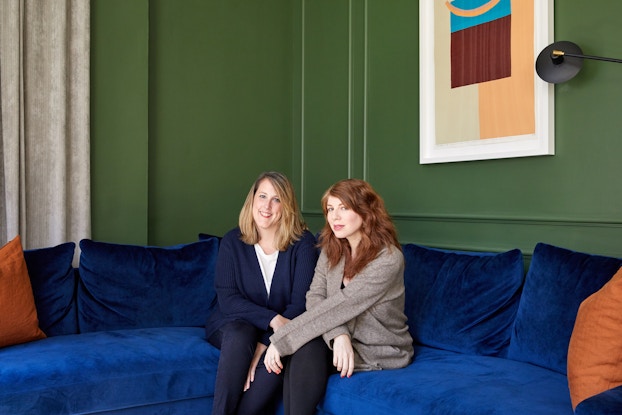
Where do you turn when you’ve got nowhere to go but up?
It’s the question that was weighing on the minds of Carolyn Childers and Lindsay Kaplan when they were rising through the ranks of their respective careers. “We were getting more and more senior in our careers,” Childers told CO—, “realizing that we were now spending so much of our time managing our teams and mentoring other people, we actually no longer had a real community for ourselves.”
Throw in the fact that many professionals at this stage have kids and families to juggle along with work, “life becomes a lot messier,” Childers said, so a support network becomes essential. This is particularly important now during the pandemic, when so many executives are cut off from their daily in-person interactions with coworkers and those in their professional networks at meet ups and conferences.
While there are plenty of professional networks out there, Childers and Kaplan weren’t finding any that specifically catered to high-performing, high-ranking female leaders. Some are ad hoc and form organically out of collaborative spaces and platforms like Luminary. Others are social platforms that have occasional meetups and live events like Chairman Mom. Still others are pretty exclusive like the Young Presidents Organization, “[and] because it only focuses on CEOs and presidents, it's almost 90% men,” Childers noted. (It’s safe to assume Childers’ observation isn’t far from the truth. There are more CEOs named James than there are female CEOs, while women are 51% of the population but only 5% of the CEOs of Fortune 500 companies.)
So, the two put their heads together and started thinking of ways to create a community aimed at senior executive women with the mission of “driving more women into positions of leadership and keeping them there,” Childers said.
It truly is executive coaching on steroids because you also get the perspective of the other people in the room and you're learning from their experiences, in addition to your own work.
Carolyn Childers, co-founder, Chief
Slaying the executive gender divide
Despite equity strides, gender parity among senior leaders of organizations in the U.S. is a long way off. Only one in five C-suite executives is a woman—and only one in 25 C-suite executives is a woman of color, according to a McKinsey & Co. report. As the authors of that report wrote: “Adding even one woman can make a material difference given the critical role top executives play in shaping the business and culture of their company.”
An IE University report found that the presence of women on management teams have a positive influence on the social goals and achievements of organizations. “With women at the helm, companies are more inclined to introduce family-friendly policies.”
This can have a massive impact on the economy, according to research from the Aspen Institute: Families lose at least $28.9 billion in wages annually because they lack access to affordable child care and paid family and medical leave.
C-suite executives like Susan Wojcicki, the CEO of YouTube, have worked to change that. After giving birth to her fifth child she not only took maternity leave but worked to increase maternity leave to 18 weeks. After that policy was put in place, Wojcicki said that the number of women who left Google had been cut in half.
Results like this resonated with Childers and Kaplan. So in January 2019, Chief launched with its first location in New York City where Childers, who previously had stints in operations and venture capital, and Kaplan, whose background was in marketing and communications, were based. “We're really focused on building an amazing group of founding members,” Childers recalled, and thought maybe they’d start by getting a hundred. By kickoff and after a little bit of press and word of mouth, they had close to 200 founding members and a waiting list that quickly swelled to 2,000.
That’s because Kaplan and Childers decided that the network would be private so founding members (as well as those who were added later) had to be nominated and vetted. Each person applying had to be a C-level executive or a rising vice president. Chief also looks at the candidate’s career experience, the size of their company and how big a team and budget they have under their management, as well as their impact, awards and other credentials.
‘Executive coaching on steroids’ model breaks funding record for a female-founded company
From there, the membership quickly increased to 700 women who were paying $7,900 for C-level or senior executives and $5,800 for vice presidents, annually. (Many members have their employers pick up the tab as it serves as leadership development they don’t have to coordinate and provide internally.) But with the cost of rent for a physical location as well as events, the two co-founders began looking for outside investors.
In June 2019, less than six months after launch, Chief secured $22 million in Series A financing, led by General Catalyst’s Ken Chenault (the former American Express CEO) and Alexa von Tobel of Inspired Capital, who both joined Chief’s board. This would become the largest Series A raised by a female-founded company that year.
The value proposition for the investors was clear, according to Childers, who said there are more than 5 million women in the U.S. who are at VP level or above. And they are, like Childers and Kaplan, hungry for connection and mentorship.
By joining Chief’s membership, they are placed in core groups of eight to 10 individuals from different industries who meet every four to six weeks with an executive coach.
“It truly is executive coaching on steroids because you also get the perspective of the other people in the room and you're learning from their experiences, in addition to your own work,” Childers underscored. Added to this small group coaching are workshops and events centered around standard management topics like building and leading teams.
Word started getting around and soon, Chief expanded its offerings outside New York City into Los Angeles and Chicago as its membership boasted more than 2,500 senior leaders from 1,700 companies including Google, IBM, HBO, Walmart, Visa, Teladoc and Spotify.
Networking
If you're looking for ways to expand your professional network, read on for some expert tips.
The diversity factor
Childers pointed out that despite the exclusivity built into Chief, its members were a diverse group. Less than 10% work in any single industry. And despite the fact that only 18% of women who are VP level and above are women of color, Childers asserted that they wanted Chief to double that percentage in their membership ranks. Currently, she says that they are at 30%.
“We have always been focused on it and really want to make sure that we are building that inclusivity and diversity while still making sure that it's vetted for the level of seniority so that it really is valuable and relevant,” she said. To ensure that diversity, Chief also offers grants for reducing the annual membership fees to $3,800 for VP-level women whose employers may not have the resources to pay the full cost.
A pandemic-pushed pivot
At the beginning of 2020, the waitlist had grown to 8,000 hopeful applicants and plans were in the works to open locations in Boston and San Francisco.
Then stay-at-home orders for the COVID-19 pandemic sidelined everything.
But it was only temporary, according to Childers. Chief quickly pivoted to begin offering virtual group sessions and events that could be watched on demand. One of the more relevant and inspiring, said Childers, was hosting Chenault. The former CEO of American Express who led the company through 9/11 and its aftermath talked to the members about leading through a crisis. Other topics Chief presented to members included Dismantling Racism at Work, Amplifying Your Executive Presence, Supporting Your Team During Uncertainty, and How to Get on Boards.
The now-virtual social network continued to be a valuable place to crowdsource recommendations for needed resources like attorneys or accountants. An outgrowth of that became a feature called Hiring Board that offers members a place to share vetted candidates.
With engagement up and plans to continue to add more members, Chief secured $15 million in a Series B round of funding in late May. Childers attributed that capital raise to Chief’s existing investors who were happy to continue to support the growing network, still drawing significant dues from its members.
Although Childers said Chief isn’t profitable yet, the investment will be put toward continued virtual services and eventually into “clubhouses” in San Francisco and Boston and potentially even London when everyone is allowed to gather in person again.
For Childers, the pandemic represents an opportunity for continued growth. “When do you need community and guidance and resources more than trying to navigate a global pandemic while trying to homeschool?” she quipped. Knowing how much these women need and how much Chief can deliver, she said with confidence, “It was built for this moment.”
CO— aims to bring you inspiration from leading respected experts. However, before making any business decision, you should consult a professional who can advise you based on your individual situation.
Want to read more? Be sure to follow us on LinkedIn!
CO—is committed to helping you start, run and grow your small business. Learn more about the benefits of small business membership in the U.S. Chamber of Commerce, here.








